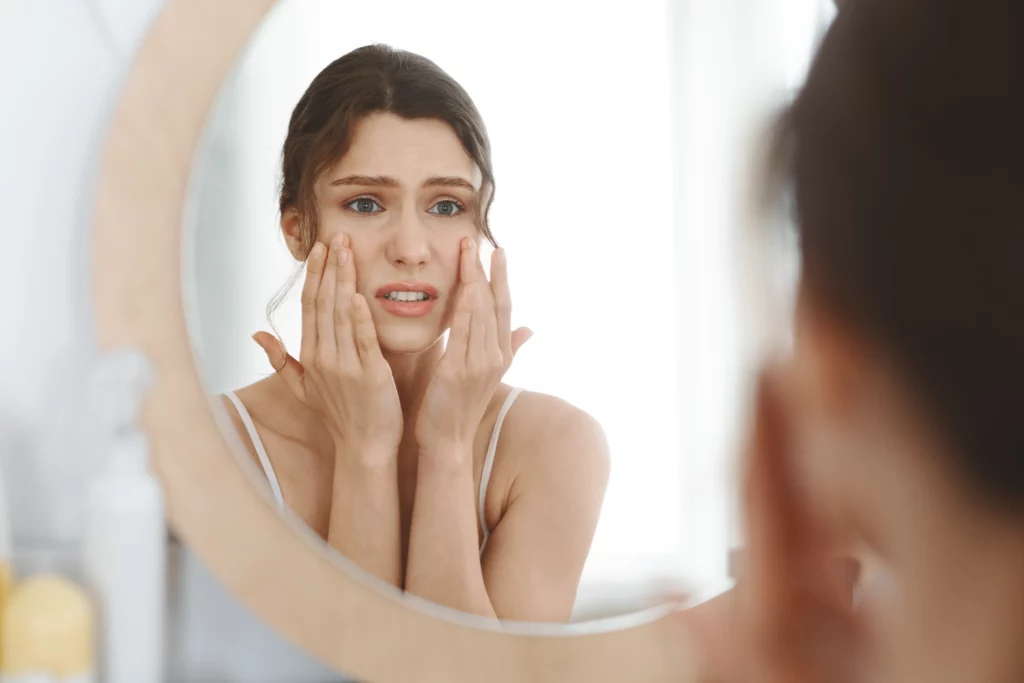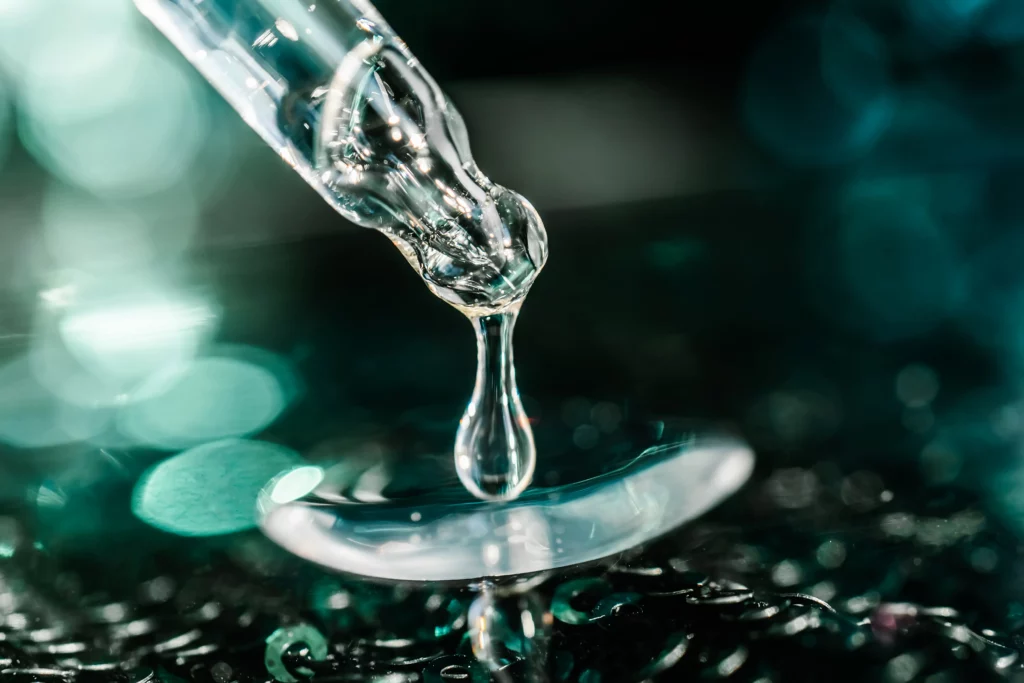
Are you regularly dealing with skin concerns like sensitivity, dryness, and irritation? Have you noticed your skin feeling more stressed in recent weeks or months? These could be signs of a damaged skin barrier - an often underestimated issue that can cause multiple skincare issues if not addressed correctly.
The skin barrier is the outermost layer of our skin that acts as a shield against external factors like pollution, UV rays, and germs. It comprises lipids, ceramides, and fatty acids that help retain moisture and keep the skin hydrated. A damaged skin barrier can cause dryness, sensitivity, and redness. That's why it is essential to protect the skin barrier by avoiding harsh skincare products, using a gentle cleanser, and applying moisturizer regularly. Maintaining a healthy skin barrier keeps your skin looking healthy and plump, prevents premature aging, and reduces the chances of developing skin problems.
Shielding your skin from further damage is paramount to maintaining a healthy skin barrier. Avoiding harsh chemicals, excessive exfoliation, and exposure to environmental stressors can help protect a damaged skin barrier.
By implementing a skincare routine that includes gentle cleansing, regular moisturizing, and skin barrier-supportive ingredients like ceramides and antioxidants, you can fortify your skin's defenses and stave off further damage. Remember, a robust skin barrier is the foundation of radiant, healthy skin.
The skin barrier, also known as the stratum corneum, is the outermost layer of your skin. It acts as a protective shield, blocking harmful environmental elements like bacteria, allergens, and pollutants while retaining essential moisture and nutrients. You cannot overstate the importance of a healthy skin barrier—it is crucial in maintaining your skin's overall health and appearance.
Functioning prevents dehydration, maintains skin elasticity, and gives your skin a smooth, plump appearance. Understanding the role and significance of the skin barrier is the first step towards effective skincare, empowering you to make informed decisions about the products and routines that will best support its health and resilience.

Recognizing the signs of damage of a skin barrier is crucial in initiating timely and effective care. When your skin barrier is compromised, you may experience various symptoms. Common signs of barrier damage include dryness, flakiness, or a rough texture, which hinders the skin's ability to retain moisture. Increased sensitivity is another sign, manifesting in redness, itching, or a burning sensation, especially when applying skincare products.
Breakouts and acne may occur more frequently, as a damaged barrier is less capable of fending off bacteria and irritants. Additionally, fine lines and wrinkles may appear more pronounced as dehydrated skin lacks the plumpness and elasticity of well-hydrated skin. Recognizing these symptoms as signs of a compromised skin barrier allows swift action to repair and restore optimal function.
Several factors can contribute to damaging your skin barrier. Environmental factors such as exposure to harsh weather conditions or pollutants can strip the skin of its natural oils, leading to a compromised barrier. Powerful ingredients in skincare products, including sulfates, alcohol, and certain fragrances, can also disrupt the skin barrier. Lifestyle choices, such as poor diet, lack of exercise, or inadequate sleep, can negatively impact the skin's health, including the integrity of its barrier.
Certain medications, particularly those that cause dryness or sensitivity, can have a similar effect. Exposure to hard water, high in minerals, can disrupt the skin's pH balance and weaken the barrier. Stress is another primary culprit; high-stress levels can trigger inflammation and disrupt the skin's natural healing processes. Lastly, genetics plays a role in the strength and resilience of your skin barrier.
Specific individuals may have a genetically predisposed weaker or more sensitive skin barrier than others. Understanding these causes can guide you in making changes that protect and reinforce your skin barrier.
Repairing a damage to the skin barrier requires a gentle and consistent approach. Firstly, consider simplifying your skincare routine and eliminating products containing potentially damaging ingredients such as sulfates, alcohol, and fragrances. Instead, opt for gentle, hydrating cleansers that clean without stripping the skin of essential oils. Moisturizing should be an integral part of your routine.
Choose a moisturizer rich in barrier-enhancing ingredients like ceramides, hyaluronic acid, and niacinamide. These ingredients not only replenish lost moisture but also aid in repairing and fortifying the skin barrier. Incorporating products with antioxidants like vitamins C and E is also beneficial, as they combat environmental stressors that can damage the wall. Calming ingredients such as aloe vera and chamomile can soothe irritated skin and reduce inflammation. If your skin barrier damage is severe, seeing a dermatologist for further guidance may be beneficial. A balanced diet and lifestyle should accompany your skincare efforts.
Consuming foods rich in omega-3 fatty acids, like fish and nuts, can boost your skin's health from within. Staying hydrated, getting ample sleep, and managing stress effectively are vital to restoring and maintaining a healthy skin barrier. Consistency is crucial in repairing a damaged skin barrier, so be patient and persistent—results may take time to become apparent. Still, the rewards of healthier, more resilient skin are worth the effort.

Beyond the basic skincare steps, certain nutrients can help revitalize your skin barrier and restore its natural state.
Ceramides are lipids that naturally occur in the skin, helping maintain its barrier and moisturize it. Products enriched with ceramides can replenish this essential component, reinforcing the skin barrier.
Hyaluronic Acid is known for holding up to a thousand times its weight in water. It helps to hydrate the skin, keeping it plump and radiant, and plays a pivotal role in repairing the skin barrier.
Niacinamide, a form of vitamin B3, is another ingredient that works wonders for the skin barrier. It boosts ceramide production, improves skin texture, and reduces inflammation.
Antioxidants like vitamins C and E protect the skin against damaging free radicals and environmental stressors. They also encourage collagen production, which enhances the skin's firmness and elasticity.
Peptides are amino acids that make up specific proteins needed by the skin. They help in restoring the skin barrier by promoting collagen production.
Lastly, Omega-3 fatty acids, commonly found in fish oil and flaxseed, can benefit dry and sensitive skin as they have anti-inflammatory properties and help strengthen the skin barrier. Including products that contain these ingredients in your skincare regimen can go a long way toward repairing and maintaining a healthy skin barrier.
A balanced diet is crucial in maintaining and strengthening the skin barrier.
Consuming foods rich in Omega-3 Fatty Acids, such as salmon, chia seeds, and walnuts, can help fortify the skin barrier due to their anti-inflammatory properties.
Vitamin C-rich foods, like oranges, strawberries, and bell peppers, promote collagen production and combat free-radical damage to the skin, thus supporting skin barrier health.
Foods high in Vitamin E, including spinach, almonds, and avocados, offer protection against UV damage and inflammation.
Zinc-rich foods, like oysters, beef, and pumpkin seeds, can accelerate the skin's healing process and enhance barrier function.
Consuming Probiotic foods, such as yogurt, kefir, and fermented vegetables, can improve gut health, leading to a healthier skin barrier. Lastly, drinking plenty of water keeps the skin hydrated, aiding in maintaining skin elasticity and resilience.
Incorporating these nutrient-dense foods into your daily diet can significantly improve skin barrier health.
Preventing further damage to your skin barrier is critical in maintaining its overall health and function. One significant factor impacting the skin barrier is exposure to the sun. Overexposure to the sun's harmful UVA and UVB rays can damage skin, including a weakened skin barrier.
Therefore, it's essential to make sunscreen a non-negotiable part of your daily skincare routine. Look for a broad-spectrum sunscreen with an SPF of 30 or higher, and remember to reapply every two hours when you're in the sun.
Next, limit your skin's exposure to harsh chemicals. Many household cleaners, detergents, and skin care products contain ingredients that can strip the skin of natural oils, disrupting the skin barrier. Opt for products labeled 'gentle' or 'sensitive skin,' and always use gloves when handling household chemicals.
Additionally, exposure to harsh weather conditions such as wind can lead to windburn, characterized by red, irritated skin. To protect against windburn, layer your skin with a barrier cream before heading outdoors in windy weather, and cover as much skin as possible with clothing.
Incorporating these measures into your skincare and lifestyle routines can go a long way in preventing further damage to the skin barrier, thus keeping it healthy and resilient over time.

Achieving healthy skin goes beyond just a good skincare routine; it also involves making specific lifestyle changes that can significantly enhance your complexion. Here are some simple tips that can make a big difference:
Remember, consistency is vital when it comes to skincare. Incorporating these tips into your lifestyle can improve your skin's health and appearance over time.
At AETHEION®, you'll find skincare products designed to protect and repair your skin barrier. For personalized treatments and therapies, visit the AETHEION MedSpa, where our skilled professionals can guide you to healthier, more radiant skin. Don't just wish for beautiful skin. Take the first step towards achieving it today!
If you liked this article, don't miss 2 Amazing Benefits of Natural Face Moisturizer